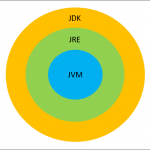
How to Start Learning Java?
Content
Why should you learn Java?
Java is amongst the most sustainable programming languages that continues to develop to date. It follows the “develop once, run anywhere” rule. Java is commonly used for building relatively larger enterprises because it scales well. This dominant factor enables giants like Google, Netflix and Amazon to utilize it. Adding Java to your skill-set will help you achieve new milestones in your career trajectory.
In this article, you will get to know how to learn Java online and the road map to achieve it.
Here’s “why” you should learn it:
- It’s beginner-friendly.
- It is in demand & popular.
- Flexible and platform-independent
- It solves real-world problems.
- It will help you excel in your career.
- You learn an interchangeable skill (helps you learn other languages e.g. C, C++, etc).
What tools do I need to setup?
Living in this age, we have a lot of liberty to choose our mode of learning. Some prefer learning online, saving the hassle of choosing the right IDE’s and development kits to download. Some like the traditional ways of following textbooks and keeping bookmarks offline. Let’s begin with online options and then move to local Java IDE’s.
Online Practise
– Java Programming for Beginners by CodeGym — An online gamified course on Java programming that’s based 80% on practice. You can take the online course, practice online in the browser, solve exercises, get instant solution verification, and join a wide community of developers. You can practically execute the 80/20 rule here. 80% practice, 20% theory! You will write tons of Java code. Solving the targeted exercises for interviews will give you enough experience to land at your future job.
– Online Java Compiler by JDoodle — It is an online compiler with android and ios mobile support. You can directly call API’s and run your code both from the app or the browser.
– Online Java compiler by IDEOne — Here’s another online editor/debugging tool. It allows you to run your code and debug it online in Java & multiple other programming languages adequately.
System installed IDE’s
– IntelliJ IDEA – It is not only a famous IDE for Java, but it also provides smart IntelliSense / coding assistance for a good range of other frameworks and languages such as SQL, JPQL, etc. By downloading CodeGym mobile app you get an automated IntelliJ plugin to work from anywhere.
– Eclipse – It is a widely trusted IDE especially for Java. Having a base workspace and an advanced plug-in system can easily customize the environment accommodating your needs.
– NetBeans – You can develop all sorts of Java applications using a set of modular software components called modules. Windows, macOS, Linux, and Solaris all provide support for NetBeans.
How to get started?
So a lot of terms go into defining your path. Your academic and technical background, your original comprehension of concepts, the number of hours you put in, etc. But here’s a generic plan that can help anyone grow if they’re ready to give what it takes!
Define and track your milestones
Establish sharp programming goals! While Java can be easy to learn, that doesn’t mean it won’t be challenging. You can soon be acquainted with it but it takes hard work, patience, and persistence to master the advanced concepts. If you do not have a clear objective behind your learning it’s very likely to quit when you face a major challenge. Hence, it is advised to know before getting started, why you want to learn Java? Do you want to become a game developer/ mobile app developer? Do you want to build a successful career out of it? Do you want to appear for a Java interview? Whatever the case might be, knowing why you’re starting will help you reach the finish line
Create an outline
Defining a content outline at this point for you might be a hassle, so we are providing you with a sequence of topics that will help you follow a plan.
- Java Syntax (Standardized format for writing any language) & Fundamentals
- Object-Oriented Programming
- Develop Core Skills (eg: developing a simple desktop app)
- Java Collections (framework for storing groups of objects)
- Libraries and frameworks (large collections of prewritten code, eg Spring)
- APIs (different protocols & tools used to build apps)
- Maven & Git (Advanced but necessary skills)
If you’re considering it for your career, we recommend spending 18-20 hours per week to learn. If you stick to this plan, you’ll probably need 6 months to a year before you apply as a fresh Java Developer.
Last but not the least, prioritize hands-on coding and bug fixing in parallel to theory. There is another point I have come across in a lot of newbies. Either they haste to develop the solution, without completely understanding why’s and how’s of a problem. Or they spend too much time on research and theory that they lag in accomplishing an error-free solution. So you have to stop and find the right balance between theory and execution.
Join an online developer’s community
It is a prevailing notion of developers being isolated and silos. But you will be surprised to know that’s more of a myth. Because there are tons of geeks enthusiastic to share their wisdom and knowledge with you. Java has a remarkably collaborative and responsive community online. You can be a part of these communities (e.g, CodeGym, Stackoverflow, Reddit, etc) to get in touch with highly talented developers. Grow the habit of googling everything you get stuck with.
You can actually act smart by not repeating the mistakes of others when their findings are free & available. Most of the time you will readily find solutions to the exact same problems posted by other devs on these platforms. Once you familiarize yourself with the language, you could even try coding competitions, hackathons, or pair-programming. This gives you a chance to learn from others, get a peer review and resolve problems as they arise.
Conclusion
Your whole journey will start with creating a course outline and following it. After you find the right balance between theory and practice, don’t hesitate to ask questions! Ask google, post on forums, do your research and validate your solutions. The more you ask questions, the more clarity you will achieve in designing a solution. Most significantly, remember why you started. Imagine how hitting the target feels like! Track your milestones, and this will keep you going.
Check out Jooble for Java internship opportunities.




